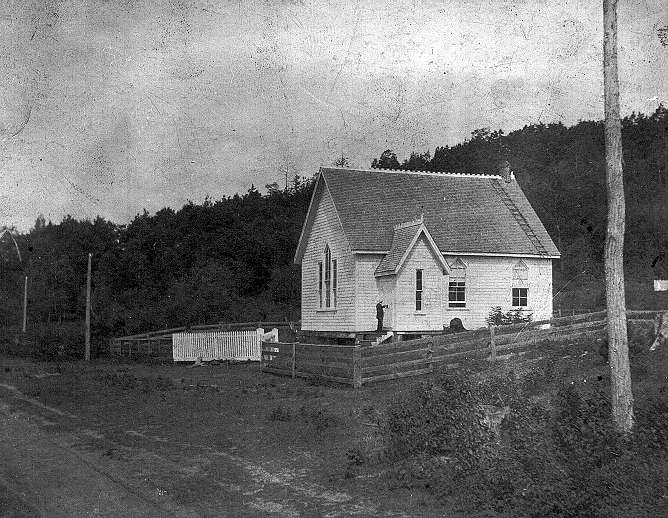DWIGHT [From the 1887 Register] Rev. Alexander Stewart, pastor.
This is one of the newest stations on the field, it was only opened a short time before
our Annual Meeting last year. Now they have to report a church
organized, membership forty-two, chapel built, which is said to be the best in Eastern
Muskoka.
Mr. Stewart, an old man, has labored here with great earnestness and sacrifice. I have
it from good authority that he has put into the church every dollar that our Society has
paid him as salary, in order that the church might be free from debt. The First Baptist
Church, in Rochester, N.Y., have sent them a stove, a good supply of hymn-books, and
material to paint the outside of the church. Our venerable missionary closes his report
with these words,
"May God Almighty awaken the Denomination to the Home Mission work that He has
given them to do, is an old man's prayer."
Mr. Stewart is almost broken down, will not be able to continue on the field this
winter.
[From the 1889 Register]
At Dwight, Father Stewart has been laboring through the Summer. For the winter the
church met and edified one another. The little band of thirty-five kept together, giving
their light forth until in God's goodness, our aged missionary returned in the spring.
Since then they have had a feast of fat things. A number of Baptist preachers from
Rochester, N.Y., spent holidays here, and at the same time preached to the people.
The minutes of the Annual Meeting of the Owen Sound Association of Regular Baptist
Churches, in 1895 when Alexander Stewart was 82 years old, include the following:
He travelled and labored as a missionary all through Grey and Bruce, through parts of
Simcoe, Wellington, Waterloo, Huron, Norfolk, and on the Indian Reservation. He did the
pioneer work and organized the churches in Durham, South Arthur, North Arthur, Mount
Forest, Priceville, Hanover, Greenock, Holland, Sullivan, Elderslie (now Chesley). He
preached and baptized in Tiverton, and the church there was organized by Rev. Wm. Fraser.
He helped in revival work and in the organization of the church amongst the Germans in
Carrick. He frequently visited Stayner. He organized the church in Goderich Township. The
church in Durham was organized with twelve members in 1853 in that room which he reared in
the forest.
One year he baptized forty-nine, another year eighty-five, another one hundred and
seven, another seventy-five. He almost never held special meetings but persistently, in
all seasons and all kinds of weather, maintained his weekly, fortnightly, and monthly
appointments, whether in Sunday or week-day. I have seen some heavy storms away north, but
I fail to recall the storm that terrified my father and kept him at home when he had an
appointment to fill. While the early settlers were hewing out their homes in parts of Grey
and Bruce, few of them could have been unacquainted with him. To visit
people in their own homes, to hold a prayer meeting in this house and in that, to give
tracts and New Testaments, to talk of the Saviour to men, women and children, to gather
the settlers in a little log school house and preach to them -- this is what he was always
at. His power with individuals was remarkable. When some poor fellow was drunk and making
a commotion in the village street, my father could sometimes go and lay his hands on him,
and lead him off home as if he were a lamb. I would to God I had his tact, and power; and
patience in dealing with individuals about spiritual things. To the little child seated on
his knee, to the most poverty-stricken, or the most reckless inhabitant, to the most
hoary-headed sinner, he always thought it worth his while to speak about Jesus. And so he
toiled year after year.
When he went to Durham he had a horse and wagon, but he sold the horse to pay for his
little lot of ground and the wagon to pay for the carpenter work on his little house. For
eight years he journeyed on foot. To get up on Sunday morning and walk to Mount Forest
(sixteen miles) for the eleven o'clock service was nothing. To start on Saturday evening
after his children were in bed and walk to Chesley (twenty-two miles) or to South Arthur
(twenty-five miles) or to Greenock (twenty-five miles), was a regular thing. If he had
occasion to go to Owen Sound (twenty-eight miles), or to Fergus (forty miles), or to
Tiverton (forty-five miles), he set off on foot as unconcernedly as one now takes the
train. One walk of his I am disposed to boast of. He had an appoint ment to preach, and to
baptize for the first time in Durham at eleven o'clock one Sunday morning. Friday
afternoon at four o'clock found him near Simcoe, County Norfolk, one hundred and twenty
miles from Durham! At that hour on Friday he started. Somebody let him ride on horseback
the last twenty miles. The rest of it he walked every foot. He preached and baptized in
Durham according to appointment on Sunday morning, "had a good time", and only
felt a little tired and footsore on Monday.
Well do I remember when at last he brought home a horse and a bridle, later on a
saddle, still later a wagon, and a set of harness. And now my own utility appeared, for I
could go with him "to raise the tunes", at his little farmhouse meetings.
Because of his immense endurance at walking [AMS wrote], he was able to reach and bring
together many widely scattered people who had been broken from their church connections by
emigrating to Canada, and by the fact that there were almost no churches at first in the
new country. It was many years before he could have a horse. Often he walked in one day
from Durham, forty miles, to visit his relatives in Fergus. There were few buildings where
he could preach religion "handsome and in out of the wet", so saw mills, barns,
settlers' log cabins, bush meetings, and school houses, or any place which would serve his
purpose of gathering people together for prayer and preaching, were used by him. One thing
helped. New settlers often were lonely, and were ready to share their simple food and
their overnight hospitality in order to have friendly conversation.
Preaching a gospel of the Ten Commandments of clean living, based on faith in God and
in salvation in Jesus Christ, and not restrained by the fear of mispronounced words or the
crooks and turns of theological hair-splitting, he made the gospel clear and became the
founder of the Baptist denomination in the counties of Grey and Bruce... Listening back
through the years, we hear him preaching with all the power of his
strong body and sincere soul, and with a rich Scotch accent, about "the unsarchable
riches of Jesus Christ", or "If the salt has lost its saviour". It would be
a good thing to put more of this Saviour into much of the polite non-evangelistic
preaching of today. He had some power from on High which made converts, for which a total
of nearly fifty years spent in college and theological seminaries by his ministerial
descendants has not furnished a substitute. The polish of culture might have helped but
the soul stuff which is under the surface is what counted.
He was fearless. A woman was persuaded to be baptized. Her husband threatened to shoot
him if he baptized her. Nevertheless, he proceeded to baptize her, and later the husband,
without his gun, appeared, and asked for baptism. Rough men, swearing, drunk and fighting,
did not scare him. Out of the most robust sinners he had the hope of making the staunchest
Christians. Neither did he fear the forest or the hazards of stormy weather. He waded a
swollen stream where broken ice was floating, in order to get to one of his appointments.
Toronto ministerial students who hoped to find a living in a parish in what was then
the new settled country, went home complaining that that man Stewart had the whole region
taken care of by his long walks, and that they could not make a living. Well, neither was
that man Stewart making a living. He did, however, take out the stumps and blaze the trail
for the Way to God for many people.
The Rev. Alex Stewart continued to come to Dwight for most of the summers around 1900.
But he was too old for further pioneering, and people began to expect preaching with a
university flavor. The log cabin parsonage was given to Mary McGinn Stewart (Mrs. Joseph
W. A. Stewart) on condition that her husband [Alexander's son] preach in the church in
summer time during his vacations. This sacred trust was faithfully carried out by the late
Dr. [J. W. A.] Stewart, for fifty years, and then was ably taken care of by Dr. Stewart's
third son, the Rev. Harold S. Stewart. ... [The Dwight property has been the summer home
and reunion place for the Stewart family ever since.]
He used to complain to visitors in his last days, saying, "I want to go back and
preach in Muskoka, but the family (meaning his daughter) won't let me."


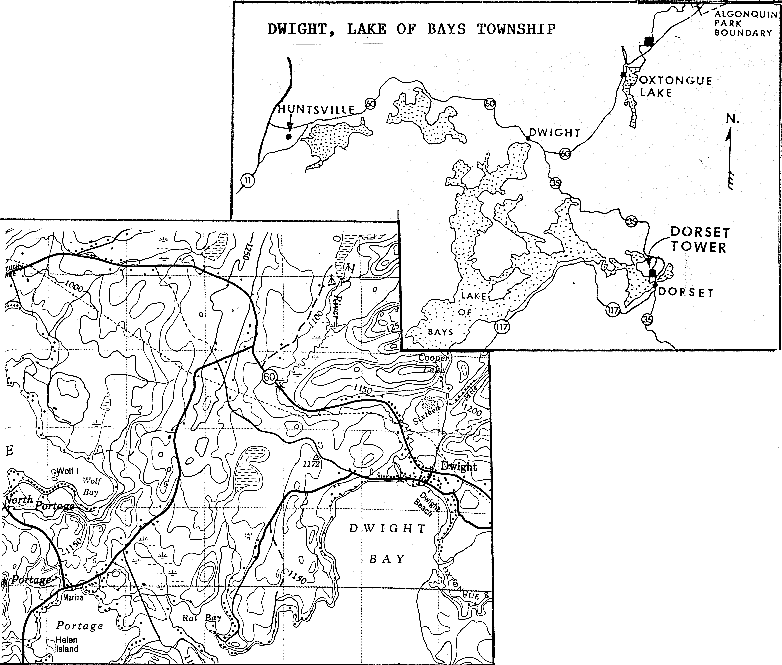

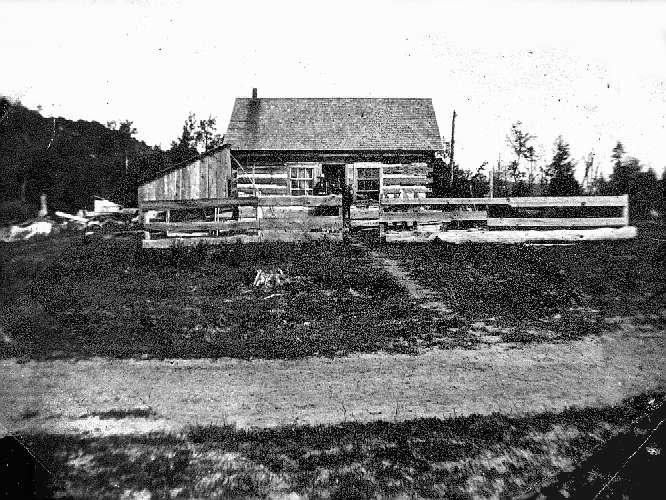
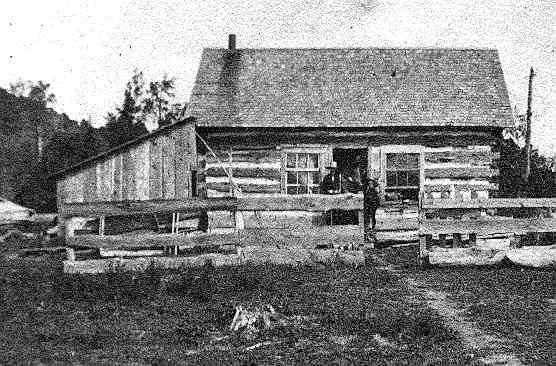
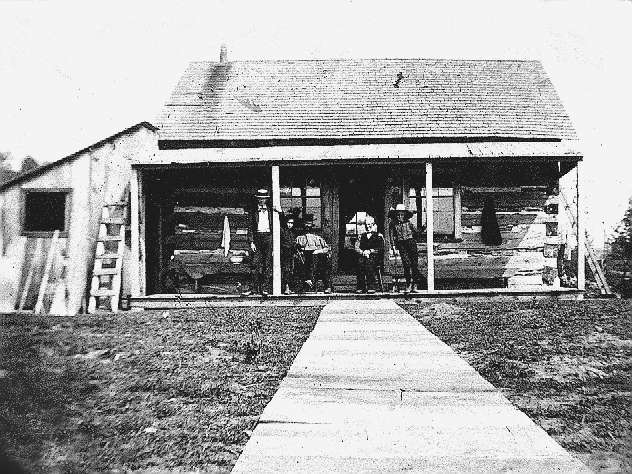
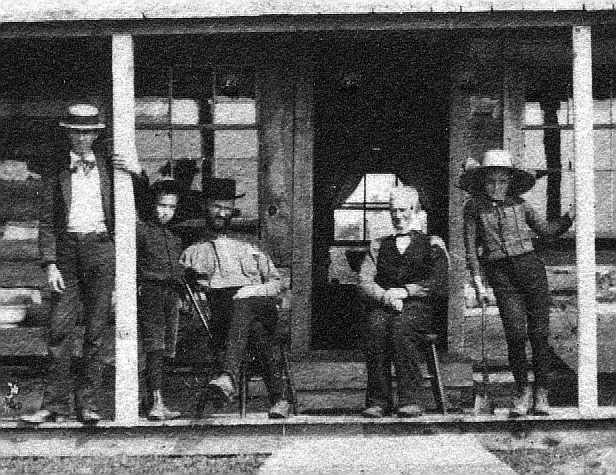
.jpg)
